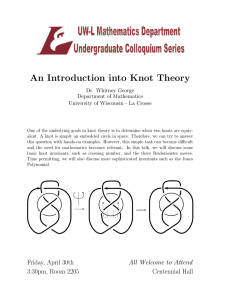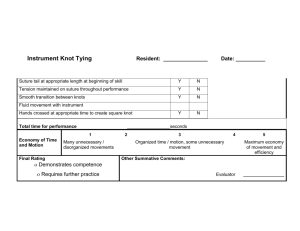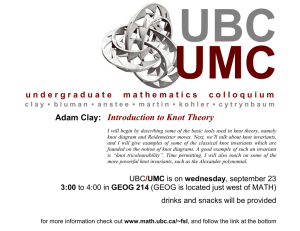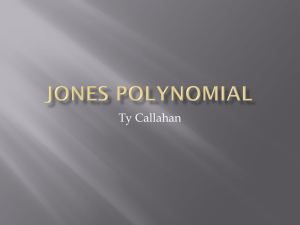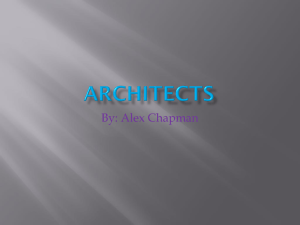Project Fact Sheet Workshop II Performing Arts and Culture in the City:
advertisement
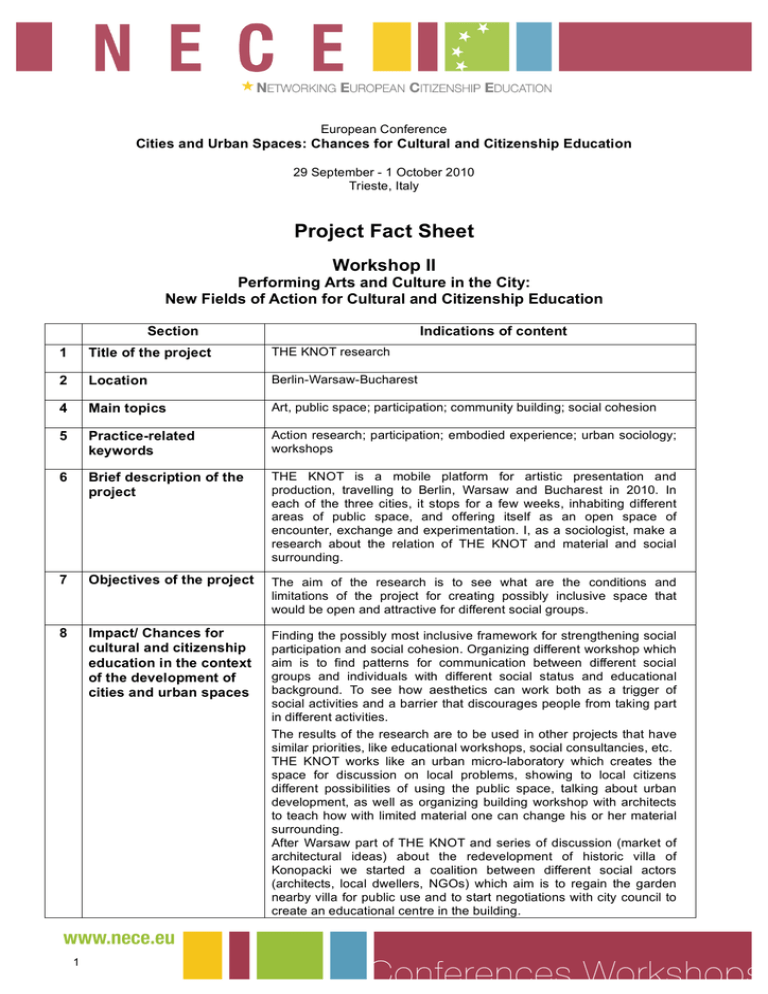
European Conference Cities and Urban Spaces: Chances for Cultural and Citizenship Education 29 September - 1 October 2010 Trieste, Italy Project Fact Sheet Workshop II Performing Arts and Culture in the City: New Fields of Action for Cultural and Citizenship Education Section Indications of content 1 Title of the project THE KNOT research 2 Location Berlin-Warsaw-Bucharest 4 Main topics Art, public space; participation; community building; social cohesion 5 Practice-related keywords Action research; participation; embodied experience; urban sociology; workshops 6 Brief description of the project THE KNOT is a mobile platform for artistic presentation and production, travelling to Berlin, Warsaw and Bucharest in 2010. In each of the three cities, it stops for a few weeks, inhabiting different areas of public space, and offering itself as an open space of encounter, exchange and experimentation. I, as a sociologist, make a research about the relation of THE KNOT and material and social surrounding. 7 Objectives of the project The aim of the research is to see what are the conditions and limitations of the project for creating possibly inclusive space that would be open and attractive for different social groups. 8 Impact/ Chances for cultural and citizenship education in the context of the development of cities and urban spaces Finding the possibly most inclusive framework for strengthening social participation and social cohesion. Organizing different workshop which aim is to find patterns for communication between different social groups and individuals with different social status and educational background. To see how aesthetics can work both as a trigger of social activities and a barrier that discourages people from taking part in different activities. The results of the research are to be used in other projects that have similar priorities, like educational workshops, social consultancies, etc. THE KNOT works like an urban micro-laboratory which creates the space for discussion on local problems, showing to local citizens different possibilities of using the public space, talking about urban development, as well as organizing building workshop with architects to teach how with limited material one can change his or her material surrounding. After Warsaw part of THE KNOT and series of discussion (market of architectural ideas) about the redevelopment of historic villa of Konopacki we started a coalition between different social actors (architects, local dwellers, NGOs) which aim is to regain the garden nearby villa for public use and to start negotiations with city council to create an educational centre in the building. 1 9 Target groups Local citizens (especially with lower income) both adults and children. Members of NGOs, artist, architects. Special impact is put on including feminist and other women's perspective. 10 Project methods/ project format Project planning schedule Participatory observation; workshops; action research; interviews 11 May-October 2010 12 Project initiator raumlabor berlin, Goethe Institute. Curators: Markus Bader, Oliver Baurnhenn, Jakub Szreder, Raluca Voinea 13 Resources involved Project financed by Goethe Institute as a part of Promised Cities project. About 50 people involved: artists, curators, architects, musicians, social scientists, urban activists, technicians, and cooks. 14 Evaluation of the project/ materials/ presentation format Interviews, photographs 15 Range and sustainability of the project Local 16 Project results Creating in a public space of Berlin, Warsaw, Bucharest universally accessible platform for intellectual exchange and social communication. Diagnosing local urban problems. Stimulating discussion on urban space. Activation of local communities and strengthening citizen attitudes. Sharing knowledge on urban space between architects, social scientists and local citizens. 17 Project funding Goethe Institute 18 Contact information THE KNOT Joanna Erbel Website: www.knotland.net/index.php?id=33 Email: joanna.erbel@duopolis.org 2
